Politics
Please stop Liz Truss making public appearances. Not for our benefit, for hers | John Crace
Sooner or later, someone is going to have to call a halt to Liz Truss’s public appearances. Not for our benefit, but for hers. We’ve nearly reached the point where we’ve tipped over into the Theatre of Cruelty. A freak show where audiences turn up just to see what mad thing she says next. Where she is egged on to make herself look ever more ridiculous. Hard to believe, I know. But every time you think you have reached Peak Trusster, Liz is there to say “hold my beer”.
It would somehow feel less grubby if Liz was in on the joke. If she was aware that her residual value is as a washed-up end-of-the-pier entertainer. Someone long past her best, churning out her greatest hit. A song that once reached Number 73 in the charts several decades ago.
But Liz is totally unaware. Blissfully ignorant. She actually believes she is still relevant. Not just to a Tory party, who just wish she would disappear under a rock – the electoral disaster whose name strikes fear among relatively sane Conservative members. PTSD. Not even just to the country who she still has not forgiven for her graceless resignation. But to the entire world. The Trusster’s stated mission is now to save western civilisation.
Most striking of all, Liz actually means this. She believes the fate of the western world resides solely in her hands. She wakes up every morning and stares at a map of the globe and plots her next move. First she takes Manhattan. Then she takes Berlin. Something like that. For narcissistic endeavour she outdoes Boris. A genuine contender for the world’s maddest person. Even Napoleon had less of a Napoleon complex. Where are her shrinks when she really needs them? They have a duty of care. Truss needs to be protected from herself.
Ninety minutes before the Liz Truss fringe event is due to start, I join a pioneering group of hacks in the auditorium. No one wants to miss this. At a party conference whose sole function is as a beauty pageant for the Fearless Four, this is the top attraction. Or distraction. Above the stage there is a screen advertising the talk with a QR code inviting audience members to send in questions. Everyone tweets this. We’re then turfed out for the next hour and made to queue.
When we’re allowed back in, the QR code has mysteriously disappeared from the overhead screen. Perhaps too many random people had submitted questions that were considered off-message. Like “Could you please explain the best way to get promoted well beyond your capabilities?” or “Don’t you ever suffer from impostor syndrome?”
I’m sure you all have variations on these questions you would like to see answered. You will be waiting a long time. Because nothing approaching these topics is allowed. There is an omertà on any suggestion that the Trusster could ever have made a mistake. Something that applies throughout the party conference. The Tories just want to pretend that Truss never happened. There is a 49-day hole in the Tory collective memory. Liz is a mistake they can never learn from because it occurred only in a parallel universe. A different space-time continuum.
On Liz, it’s best to draw a veil over her 45-minute appearance. Mainly out of decency. The Trusster shouldn’t be allowed out without a responsible adult in attendance. Someone to advise her to say: “No comment.” Because whatever medication she is on – and it must be a lot to produce that disturbingly affectless delivery – it’s not enough. In her own private world – the only one that counts – she is queen of all she surveys.
Safe to say that the Trusster is completely unrepentant. She believes all that went wrong is that we didn’t get enough of her. Elle ne regrette rien. Her confusion is total. She was brought down by the establishment; unaware that she once was at the centre of that establishment as prime minister. Others were to blame for her ignorance. Britain was in the clutch of a socialist cabal led by the Tories and Labour establishment. Wokery was bringing down the west. She could have done a better job at the last election than Rishi Sunak.
Just make it stop. Just make it stop. I feel as if I’m colluding in someone’s personal breakdown. That I’m a participant in something unpleasant. Please tell Liz she wasn’t just a useless prime minister: she was a useless constituency MP. Her Norfolk voters had had enough of her. She is now an irrelevance. Just that strange person who no one will recognise at the Cenotaph in years to come. The session was billed to last an hour but her interviewer, the Telegraph columnist Tim Stanley, wrapped things up after 45 minutes. It was the greatest kindness he could bestow on her.
after newsletter promotion
Elsewhere, the Tory conference trundled on its own meaningless way. Jeremy Hunt opened proceedings in the hall. No one quite knew why. Who cares what a bloke who isn’t going to be shadow chancellor in a month’s time thinks? Jezza didn’t seem to notice. He declared the economy to be in tip-top shape. You can’t buy that kind of razor-sharp analysis.
Otherwise it was the Fearless Four competing to say the same things to the same people over and over again in different meetings. Without anyone appearing to get bored. They must be on autopilot. We are in an echo chamber par excellence. Where supporters follow their man or woman around and laugh at the same jokes to give themselves a sense of purpose.
In the main hall it was the turn of Tom Tugendhat and Kemi Badenoch to be interviewed for an hour each. Tom was so desperate not to remind people he had been in the army and had killed people that he kept talking about his time in the army. Still, he kept his supporters happy. Kemi merely tried not to get into a fight with Chris Hope, who was asking the questions. She gives the impression she doesn’t really like anyone. Even herself. Not exactly the qualities most people are looking for in a leader. But then the Tories are a law unto themselves.
Politics
Michael Gove says personal attacks on ex-wife Sarah Vine hurt most in his career

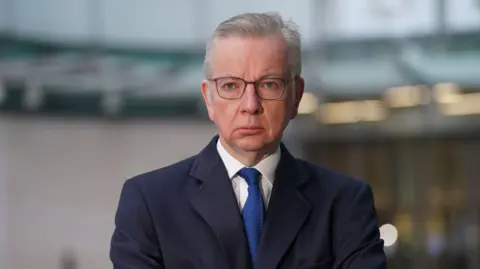 PA
PAFormer Conservative cabinet minister Michael Gove has said critics’ attacks of his ex-wife Sarah Vine was “the thing that really hurt most” during his political career.
Gove said Vine was “portrayed as a sort of Lady Macbeth figure” as he weighed up backing Boris Johnson for Tory leader, following the Brexit vote in 2016.
He said the “fact she was attacked in that way at a time of turmoil overall was incredibly hurtful”.
Gove – who stood down as an MP ahead of June’s general election – opens up about his most difficult moments in politics on his new BBC Radio 4 series.
In Surviving Politics with Michael Gove, the former education secretary speaks candidly with politicians from different parties about the strengths and skills needed in tough times.
For one episode, Gove interviewed Labour spin doctor and former cabinet minister Peter Mandelson.
Now editor of the Spectator magazine, Gove asked Mandelson what advice he would give new Labour MPs who have entered Parliament following this year’s general election.
“Be very clear what you believe in, what your convictions are, what your project is and what you want to achieve,” Mandelson said.
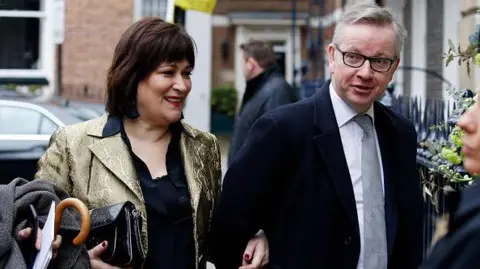 Getty Images
Getty ImagesHe then asked Gove: “All sorts of things have happened to you in the course of your political career. If you had to identify one really personal thing that hurt, what was that?”
Gove recalled how in 2016, Vine accidentally sent a private email – meant to be read by him and his close advisors – to a member of the public, who leaked it to the press.
In the email, Vine had advised her husband to get assurances from Johnson “otherwise you cannot guarantee your support” for his leadership bid.
Two days later, Johnson unexpectedly withdrew, after Gove made a surprise attempt to become leader of the Conservative Party.
Gove said his ex-wife, “whom I still love very much”, was “a strong woman” and disputed the comparison to Lady Macbeth.
Gove said: “It’s always fine if you’re being attacked on ground where you think, yeah, I’m happy to defend myself.
“But when it’s a misunderstanding and a misunderstanding that affects someone close to you, that’s particularly difficult.”
He added: “It’s when people seek to construct a narrative and they draw someone else in and that person is collateral damage in an attack on you. It hurts so much.”
Mandelson said he saw “an echo of that in my own life, with my own partner, now husband, when they went for him and they did”.
In the interview, Mandelson said: “I didn’t even think I could necessarily enter Parliament because I was gay.”
He said he lived openly with his partner and was told by people “you’re going to find it very difficult to be selected.
“And it was a struggle and in the 1987 election, which was the first campaign I directed, I was targeted viciously by the News of the World,” he said.
Mandelson talked about internal Labour divisions and the power struggle between Gordon Brown and Tony Blair as they vied for leadership of the party in the 1990s.
In a conversation about “change-makers” in the current Labour government, Mandelson described Health Secretary Wes Streeting as “courageous”.
Mandelson said: “Courageous and foolhardy? Let’s see I don’t see any point in being in politics unless you’re going to be a minister like that.”
He said “if there are others like Wes Streeting, then I’ll certainly be supporting them”.
You can listen to all episodes of Surviving Politics with Michael Gove from Monday 21 October 2024 on BBC Sounds.
Politics
Robert Jenrick’s leadership bid: Local Tories reacts

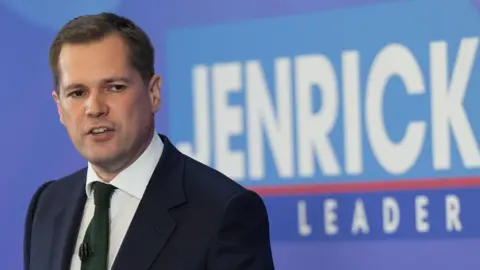 PA Media
PA MediaThe MP for Newark has made it through to the final two of the Conservative leadership contest along with Essex MP Kemi Badenoch – but do the locals think Robert Jenrick is the right person for the job?
“We need to get it right this time”, Conservative activist Jenni Oliver tells me, as she takes a sip from her cappuccino.
Tory members like Ms Oliver have grown accustomed to choosing prime ministers, but now they’re selecting the leader of the opposition.
“We voted Liz Truss in. That was a big mistake as far as I was concerned. Boris Johnson? No.”
“For me, that’s where the Conservatives lost it.”
The activists I am meeting for a coffee in the Nottinghamshire market town of Newark have real skin in the game this time.
Unsurprisingly, members of Jenrick’s local Conservative association all believe he is the best person to revive the party’s fortunes.
Tony Roberts, the president of the association, argues that the former cabinet minister has “really matured” as a politician.
Seen initially as an ally of David Cameron on the more “moderate” wing of the party when he became an MP in 2014, Jenrick has shifted to the right after quitting as immigration minster last year.
They accept that while his views might have changed over the years, his Conservative “values” are the same.
Tories here have fond memories of knocking on doors for Jenrick when he was first elected in a by-election a decade ago.
Sue Saddington, a local councillor, recalls having his campaign team over to her house for shepherd’s pie.
Now she is salivating again at the prospect of him becoming leader.
The local area “will really wake up to the fact that they have somebody of stature now in Newark,” she said.
“I think Newark will absolutely rejoice to it.”
It is a bold claim in a seat where more than 60% of voters backed other candidates in the July general election.
Jenrick’s majority was slashed from 22,000 to 3,500, with both Labour and Reform UK making huge gains at the election
He is now the only Conservative MP anywhere in Nottinghamshire or neighbouring Derbyshire.
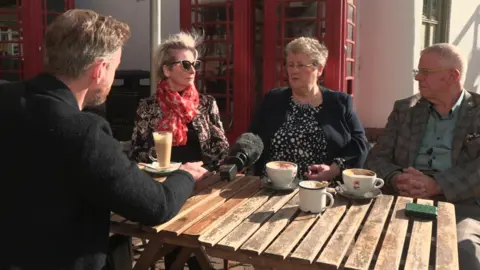
That result is described as a mere “blip” by Mr Roberts.
His more immediate concern is the limited options given to members in the leadership election.
“We’ve got just two, right-wing candidates and I would have liked the membership to have a wider choice,” he said.
“That’s why going down to two was a mistake, it should have been at least three.”
The timetable of the election race is also mistake.
Unless a candidate drops out, the result will be announced after the Budget – meaning Rishi Sunak, not his successor, will respond to Chancellor Rachel Reeves.
And what of the bookies’ favourite to be next Tory leader, Kemi Badenoch?
Both Ms Saddington and and Mr Toberts stress the importance of the party uniting behind whoever wins.
But Ms Oliver is not convinced.
“Personally, I think it’ll be a few months – it could be another Liz Truss,” she said.
Politics
Challenged on death of Dawn Sturgess, Russian ambassador dismisses inquiry

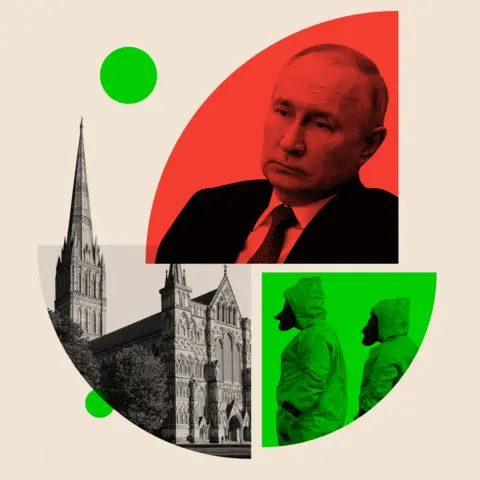 BBC
BBCThe family of Dawn Sturgess, who died six years ago after coming into contact with Novichok, have been calling on Vladimir Putin to speak to the inquiry after her death in the Salisbury poisonings.
I put their request directly to Andrei Kelin, the Russian ambassador to the UK, in as part of a wide-ranging sit-down interview that will be broadcast on Sunday.
“I hardly believe President Putin will go to Britain just to testify something,” he said.
The UK government holds Russia, and two Russian agents, known as Alexander Petrov and Ruslan Boshirov, responsible for the attack.
Andrei Kelin questioned the need for an inquiry. “Why drag this history so long?”
He also rejected suggestions Petrov or Borishov should attend, saying the men had already given answers on TV – referring to a 2018 interview they gave on Russian state TV in which they claimed they had just been visiting Salisbury Cathedral.
That claim was mocked by some in Russia. UK officials called the interview “risible”.
Challenged with the fact that the UK, US, France, Germany, Canada all believe the attack was carried out by Russia with Novichok manufactured in Russia, Kelin said that “too many governments” were involved and dismissed their allegation as “nonsense“.
Pressed to give a response to the Sturgess family, the ambassador appeared to laugh, saying: “I have never met this family … If someone has died, of course we are concerned about that.”
On Ukraine, Kelin accused the UK of “waging war” on Russia by supporting the country with weapons and resources. If Zelensky “won’t negotiate with us, fine”, he said. “He will lose more and more terrain.”
This week, the Ukrainian president published a so-called victory plan to try to bring the conflict to an end next year.
It includes a formal request to join Nato and the lifting of bans on long-range strikes with Western-supplied weapons deep into Russia.
Challenged on Russia’s illegal invasion and stalemate in the war, the ambassador said Zelensky “does not want peace … he continues to ask for more and more; Nato, EU assistance, defence packages.
“Anything, but nothing about negotiations at all.”
Kyiv, backed by its allies, has always rejected any suggestions of negotiation after the Russian invasion. They believe that would mean the permanent loss of Ukrainian territory.
Western governments believe that Putin is under rising pressure at home, with increasing casualties and the huge cost of the war. Even Moscow’s finance ministry has acknowledged the intense strain on the economy.
But Kelin claims Russia is living “absolutely normal life”.
Asked if the suffering on both sides kept him awake at night, he said: “No one likes the war.” He said it could stop if the West stopped supplying arms to Ukraine.
“We are not just going to say, OK, [from] tomorrow we do not shoot each other. We won’t.”
On Friday, Keir Starmer reiterated his support for Ukraine. “We have always said that it is for the Ukrainian people to decide their own future so we’re clear, together with President Zelensky, that the only acceptable outcome is a sovereign Ukraine and a just peace.”
He also said Russia was getting weaker, with the war soaking up 40% of its budget, and the government believing there were more than 600,000 dead or wounded Russians, and another 500,000 casualties predicted by the end of the year.
With reports in recent days that North Korean troops are backing the Kremlin in the conflict, Kelin was challenged on Russia’s reliance on pariah states like North Korea and Iran.
“For us, it’s normal people, we have been friends, and we have a lot of common interests with North Korea and Iran … Anything bad – we do not see it.”
And on the American election, with just weeks to go, the ambassador claimed the winner didn’t make a difference at all. He said there was a “two-party consensus” on Russia – “and this is anti-Russian sentiment”.
The ambassador said that Russia had changed its nuclear doctrine in response to conversations among Western allies about allowing Ukraine to use long-range missiles supplied by them to fire into Russia.
Russia now says it would consider an attack from a non-nuclear state that’s backed by a nuclear-armed one to be a “joint attack”. That has been construed as a threat to use nuclear weapons in Ukraine.
Jens Stoltenberg, the former Nato boss, said the West had “called Putin’s bluff” over nuclear threats – implying it had crossed many of Putin’s red lines without anything happening.
Kelin said Stoltenberg’s statement itself was “a bluff” – adding Russia would protect itself “with all the means that are in our disposal, and believe me, there are lots of them.”
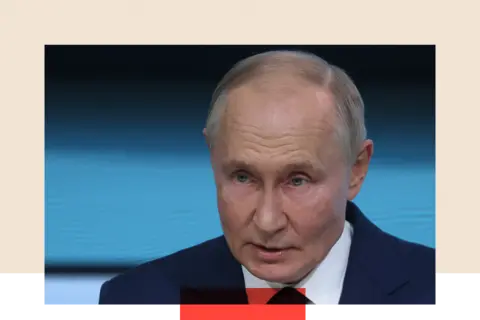 Getty Images
Getty ImagesIt is hard to overstate the impact of the Salisbury attacks on the fraught relationship between the UK and Russia.
A senior figure involved in the UK government response told me it was a “huge tipping point.
“It was shocking in the fact that the Russians were trying to kill people on our soil, but also, so blatantly happy for us to know that it was them,” they said, pointing to the use of Novichok, known to be manufactured and used by the Russian state.
Only a year before, then-Foreign Secretary Boris Johnson had gone to Moscow in the hope of a “reset” of the relationship between the two countries.
But another senior source told me: “we simply couldn’t have a normal relationship with them again with that in the background”.
They described the poisonings as worse than anything that had happened in the Cold War. “The competition was pretty brutal then, but this kind of thing was completely unacceptable.”
More than 20 Western allies expelled diplomats and spies from their countries in response after a bout of frantic diplomacy by Theresa May’s government, including pushing former President Trump to act.
One figure recalls, “it was pretty hairy at the time, a lot of Europeans didn’t want to do it. Trump personally didn’t want to do it but was persuaded to do so”.
The UK insisted that the announcement of the expulsions from each country was made at exactly the same time, with only the UK aware of how many Russians each government planned to order to leave.
The fear in Downing Street was that Trump would not be willing to take drastic action if he had known the numbers each European country were planning to expel.
The UK government now believes that Russia is the number one threat to the UK’s security.
Labour said in the election: “the defence of the UK starts in Ukraine,” and ministers believe the same now they are in government.
The UK has been at the forefront of leading the Western backing of Ukraine since the invasion in 2022, and has sent billions of pounds worth of weapons and resources to support the effort.
It’s given staunch political backing to President Zelensky – but don’t expect a decision on his request to use Western long-range missiles for at least a few weeks.
There are concerns in government about Russia increasing its efforts at sabotage on UK soil, with the boss of MI5 warning this week Russia was more and more engaged in “arson, sabotage and more dangerous actions conducted with increasing recklessness”.
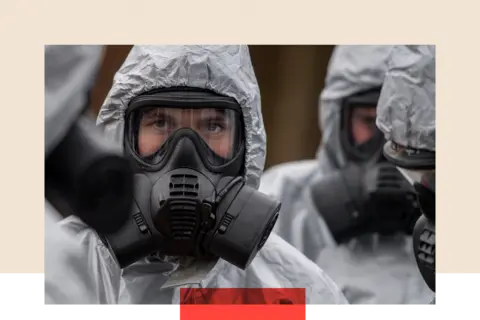 Getty Images
Getty ImagesBack in 2018, when the poisonings happened, the UK had no way of predicting how Russia’s aggression would grow into what one source calls an “off-the-charts bigger crisis” – with its illegal invasion of Ukraine.
But as the Salisbury inquiry delves into the impact of the poisoning on one innocent British family, its significance as a moment of the rupture in relations is clear too.
That’s caught in a conversation understood to have taken place between UK national security adviser Mark Sedwill and his Russian counterpart at the time, after Western allies had expelled 300 diplomats.
“You seem to want to take us back to the days of the Cold War,” the Russian said.
“Well, Yuri, at least we all knew the rules then,” Sedwill responded.
You can watch our interview with Russian ambassador Andrei Kelin tomorrow at 09:00 on Sunday with Laura Kuenssberg on BBC One. We’ll also talk to Health Secretary Wes Streeting.
Top photo credit: Getty Images


BBC InDepth is the new home on the website and app for the best analysis and expertise from our top journalists. Under a distinctive new brand, we’ll bring you fresh perspectives that challenge assumptions, and deep reporting on the biggest issues to help you make sense of a complex world. And we’ll be showcasing thought-provoking content from across BBC Sounds and iPlayer too. We’re starting small but thinking big, and we want to know what you think – you can send us your feedback by clicking on the button below.
Politics
Weight loss jabs for unemployed not dystopian, says Wes Streeting
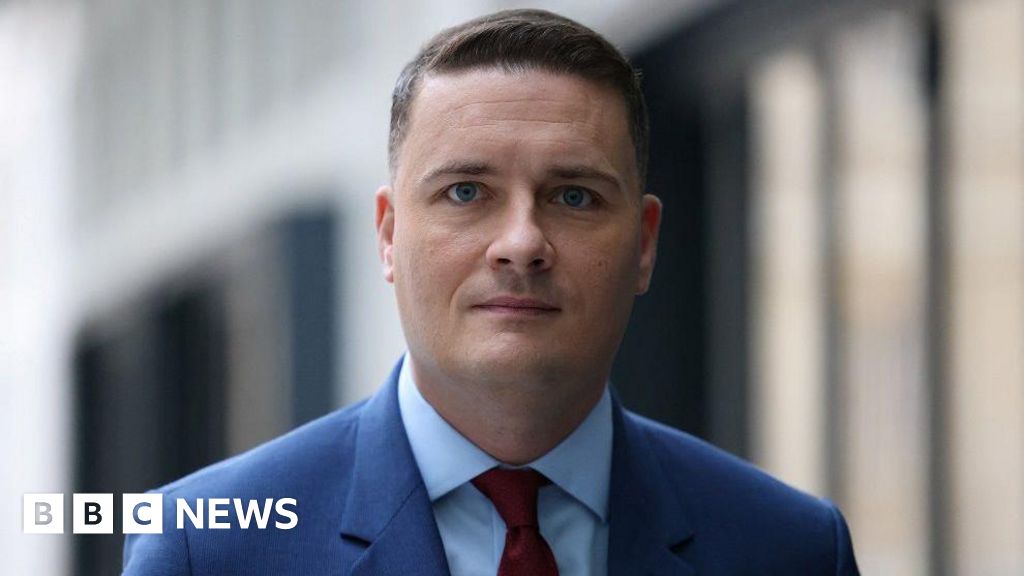
Health Secretary Wes Streeting has dismissed suggestions that plans to provide weight loss jabs to unemployed people with obesity are “dystopian.”.
The UK government is launching a five-year trial with pharmaceutical giant Lilly to test if the weight-loss drug Mounjaro can help get more people back to work and ease the strain on the NHS in England by preventing obesity-related diseases.
The announcement prompted a backlash, with accusations that the government was stigmatising unemployed individuals and reducing people to their economic value.
Speaking on Sunday with Laura Kuenssberg, Streeting said the jabs were part of a broader healthcare plan, adding that he was “not interested in some dystopian future where I involuntarily jab unemployed people who are overweight”.
“There’s a lot of evidence already that these jabs combined with changes to diet and exercise can help people to reduce their weight but also prevent cardiovascular disease and also diabetes which is game-changing,” Streeting said.
But he cautioned against creating a “dependency culture”.
Some injections are already prescribed on the NHS for the treatment of obesity, and also for people with diabetes.
Prime Minister Sir Keir Starmer previously told the BBC the jabs would be “very helpful” to people who want and need to lose weight.
“[The drug is] very important for our NHS, because, yes we need more money for the NHS, but we’ve also got to think differently”.
The NHS’s latest Health Survey for England shows in 2022, 29% of adults in England were obese and 64% were deemed to be overweight.
Illnesses relating to obesity cost the NHS £11bn a year, Streeting said.
Obesity has also been linked to the development of type 2 diabetes, with the NHS spending around £10bn a year – 9% of its budget – to care for people with diabetes.
Politics
Minister relinquishes Grenfell brief after survivors object
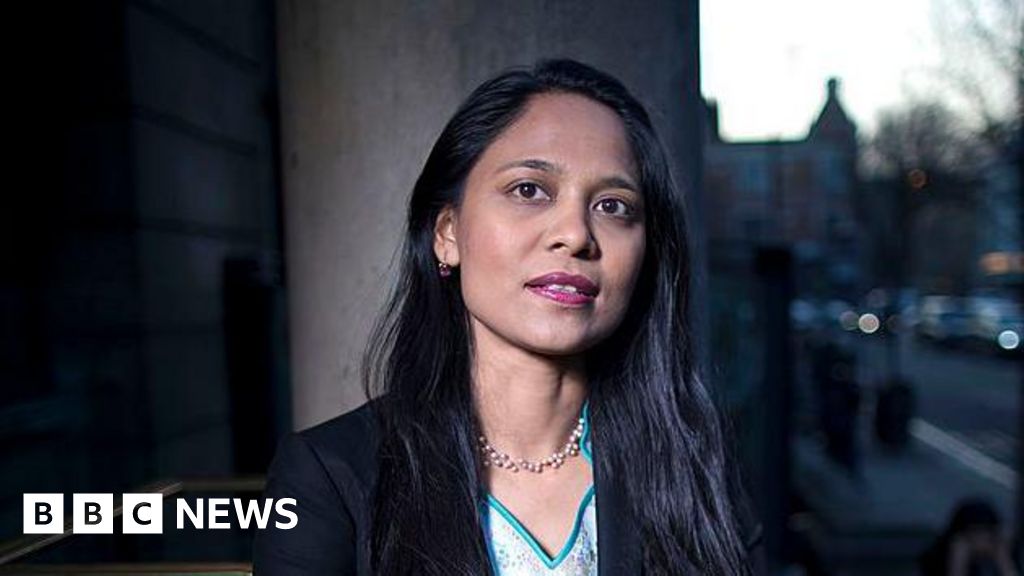
A Labour minister in the housing department has given up her duties managing building safety and the government’s response to the Grenfell Tower fire.
According to the Sunday Times, survivors of the tragedy had called for Rushanara Ali to stand down after the newspaper highlighted her attendance at the Franco-British Colloque, a conference that brings together senior politicians, civil servants and business leaders.
For many years, the conference has been co-chaired by Pierre-André de Chalendar, who until recently served as chairman of Saint-Gobain – the parent company of one of the firms heavily criticised in the recent Grenfell inquiry.
While the MP for Bethnal Green and Stepney is not resigning as a minister, she said she was relinquishing her building safety brief because “perception matters”.
The last meeting of the Colloque was held in January, several months before the general election.
Mr De Chalendar reportedly no longer serves as the co-chair of the conference.
The former head of Saint-Gobain was in charge of the company at the time of the Grenfell fire, when it was a majority shareholder of Celotex.
Celotex was one of the firms to manufacture the combustible insulation inside the cladding on Grenfell Tower.
The Grenfell Inquiry’s Phase 2 report heavily criticised Celotex for launching a “dishonest scheme to mislead its customers” over the suitability of its insulation for use on high-rise buildings.
According to the register of MPs’ interests, Ali was one of half a dozen MPs who attended this year’s Colloque in Paris in January.
Ali was re-elected to her east London seat in July, where she has been an MP since 2010.
In a statement, the Minister for Homelessness and rough sleeping said: “Trusted relationships between ministers and the Grenfell community are essential for this Department.
“Before I became a minister, I called for the French delegation of the Franco-British Colloque to cut ties with Saint Gobain. But I understand that perception matters and I have therefore concluded that the building safety portfolio would be best transferred to another minister.
“Our goals of making buildings safe and preventing another tragedy continue to be very important issues for me, and the deputy prime minister and the rest of the ministerial team have my full support in delivering on this work.”
Politics
The Tata family member who became a British MP and fought for India’s freedom

 Picryl
PicrylThe name Shapurji Saklatvala may not be one that leaps out of the history books to most people. But as with any good tale from the past, the son of cotton merchant – who is a member of India’s supremely wealthy Tata clan – has quite a story.
At every turn, it seems that his life was one of constant struggle, defiance and persistence. He shared neither the surname of his affluent cousins, nor their destiny.
Unlike them, he would not go on to run the Tata Group, which is currently one of the world’s biggest business empires and owns iconic British brands like Jaguar Land Rover and Tetley Tea.
He instead became an outspoken and influential politician who lobbied for India’s freedom in the heart of its coloniser’s empire – the British Parliament – and even clashed with Mahatma Gandhi.
But how did Saklatvala, born into a family of businessmen, pursue a path so different from his kin? And how did he blaze a trail to become one Britain’s first Asian MPs? The answer is as complex as Saklatvala’s relationship with the his own family.
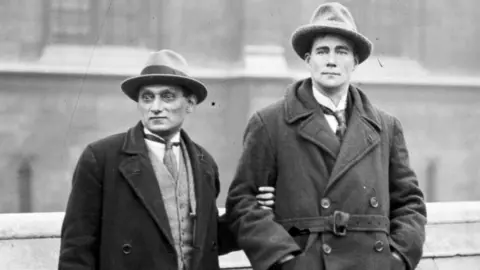 Getty Images
Getty ImagesSaklatvala was the son of Dorabji, a cotton merchant, and Jerbai, the youngest daughter of Jamsetji Nusserwanji Tata, who founded the Tata Group. When Saklatvala was 14 years old, his family moved into Esplanade House in Bombay to live with Jerbai’s brother (whose name was also Jamsetji) and his family.
Saklatvala’s parents separated when he was young and so, the younger Jamsetji became the main paternal figure in his life.
“Jamsetji always had been especially fond of Shapurji and saw in him from a very early age the possibilities of great potential; he gave him a lot of attention and had great faith in his abilities, both as a boy and as a man,” Saklatvala’s daughter, Sehri, writes in The Fifth Commandment, a biography of her father.
But Jamsetji’s fondness of Saklatvala made his elder son, Dorab, resent his younger cousin.
“As boys and as men, they were always antagonistic towards each other; the breach was never healed,” Sehri writes.
It would eventually lead to Dorab curtailing Saklatvala’s role in the family businesses, motivating him to pursue a different path.
But apart from family dynamics, Saklatvala was also deeply influenced by the devastation caused by the bubonic plague in Bombay in the late 1890s. He saw how the epidemic disproportionately impacted the poor and working classes, while those in the upper echelons of society, including his family, remained relatively unscathed.
During this time, Saklatvala, who was a college student, worked closely with Waldemar Haffkine, a Russian scientist who had to flee his country because of his revolutionist, anti-tsarist politics. Haffkine developed a vaccine to combat the plague and Saklatvala went door-to-door, convincing people to inoculate themselves.
“Their outlooks had much in common; and no doubt this close association between the idealist older scientist and the young, compassionate student, must have helped to form and to crystallise the convictions of Shapurji,” Sehri writes in the book.
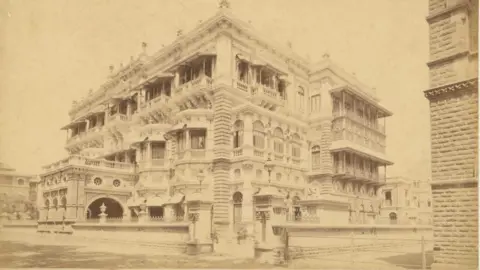 Getty Images
Getty ImagesAnother important influence was his relationship with Sally Marsh, a waitress he would marry in 1907. Marsh was the fourth of 12 children, who lost their father before becoming adults. Life was tough in the Marsh household as everybody had to work hard to make ends meet.
But the well-heeled Saklatvala was drawn towards Marsh and during their courtship, he was exposed to the hardships of Britain’s working class through her life. Sehri writes that her father was also influenced by the selfless lives of the Jesuit priests and nuns under whom he studied during his school and college years.
So, after Saklatvala travelled to the UK in 1905, he immersed himself in politics with an aim to help the poor and the marginalised. He joined the Labour Party in 1909 and 12 years later, the Communist Party. He cared deeply about the rights of the working class, in India and in Britain, and believed that only socialism – and not any imperialist regime – could eradicate poverty and give people a say in governance.
Saklatvala’s speeches were well received and he soon became a popular face. In 1922, he was elected to parliament and would serve as an MP for close to seven years. During this time, he advocated ferociously for India’s freedom. So staunch were his views that a British-Indian MP from the Conservative Party regarded him as a dangerous “radical communist”.
During his time as an MP, he also made trips to India, where he held speeches to urge the working class and young nationalists to assert themselves and pledge their support for the freedom movement. He also helped organise and build the Communist Party of India in the areas he visited.
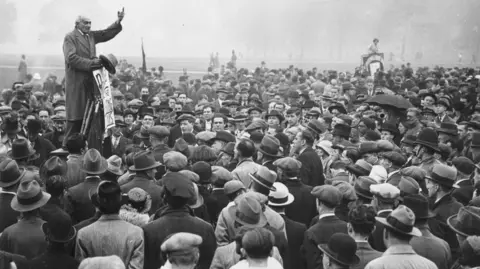 Getty Images
Getty ImagesHis strident views on communism often clashed with Mahatma Gandhi’s non-violent approach to defeat their common adversary.
“Dear Comrade Gandhi, we are both erratic enough to permit each other to be rude in order to freely express oneself correctly,” he wrote in one of his letters to Gandhi, and proceeded to mince no words about his discomfort with Gandhi’s non-co-operation movement and him allowing people to call him “Mahatma” (a revered person or sage).
Though the two never reached an agreement, they remained cordial with each other and united in their common goal to overthrow British rule.
Saklatvala’s fiery speeches in India perturbed British officials and he was banned from traveling to his homeland in 1927. In 1929, he lost his seat in parliament, but he continued to fight for India’s independence.
Saklatvala remained an important figure in British politics and the Indian nationalist movement until his death in 1936. He was cremated and his ashes were buried next to those of his parents and Jamsetji Tata in a cemetery in London – uniting him once again with the Tata clan and their legacy.
-

 Science & Environment1 month ago
Science & Environment1 month agoHyperelastic gel is one of the stretchiest materials known to science
-

 Technology4 weeks ago
Technology4 weeks agoIs sharing your smartphone PIN part of a healthy relationship?
-

 Science & Environment1 month ago
Science & Environment1 month ago‘Running of the bulls’ festival crowds move like charged particles
-

 Science & Environment1 month ago
Science & Environment1 month agoHow to unsnarl a tangle of threads, according to physics
-

 Science & Environment1 month ago
Science & Environment1 month agoMaxwell’s demon charges quantum batteries inside of a quantum computer
-

 Technology1 month ago
Technology1 month agoWould-be reality TV contestants ‘not looking real’
-

 Science & Environment4 weeks ago
Science & Environment4 weeks agoX-rays reveal half-billion-year-old insect ancestor
-

 Science & Environment1 month ago
Science & Environment1 month agoSunlight-trapping device can generate temperatures over 1000°C
-

 Science & Environment1 month ago
Science & Environment1 month agoLiquid crystals could improve quantum communication devices
-

 Science & Environment1 month ago
Science & Environment1 month agoQuantum ‘supersolid’ matter stirred using magnets
-

 Womens Workouts4 weeks ago
Womens Workouts4 weeks ago3 Day Full Body Women’s Dumbbell Only Workout
-

 Science & Environment1 month ago
Science & Environment1 month agoWhy this is a golden age for life to thrive across the universe
-

 Science & Environment1 month ago
Science & Environment1 month agoQuantum forces used to automatically assemble tiny device
-

 Science & Environment1 month ago
Science & Environment1 month agoLaser helps turn an electron into a coil of mass and charge
-

 Science & Environment1 month ago
Science & Environment1 month agoNerve fibres in the brain could generate quantum entanglement
-

 Science & Environment1 month ago
Science & Environment1 month agoHow to wrap your mind around the real multiverse
-

 TV3 weeks ago
TV3 weeks agoসারাদেশে দিনব্যাপী বৃষ্টির পূর্বাভাস; সমুদ্রবন্দরে ৩ নম্বর সংকেত | Weather Today | Jamuna TV
-

 Technology3 weeks ago
Technology3 weeks agoUkraine is using AI to manage the removal of Russian landmines
-

 Science & Environment1 month ago
Science & Environment1 month agoA slight curve helps rocks make the biggest splash
-

 Science & Environment1 month ago
Science & Environment1 month agoA new kind of experiment at the Large Hadron Collider could unravel quantum reality
-

 Science & Environment1 month ago
Science & Environment1 month agoITER: Is the world’s biggest fusion experiment dead after new delay to 2035?
-

 News1 month ago
News1 month ago▶️ Hamas in the West Bank: Rising Support and Deadly Attacks You Might Not Know About
-
News1 month ago
the pick of new debut fiction
-

 Science & Environment1 month ago
Science & Environment1 month agoTime travel sci-fi novel is a rip-roaringly good thought experiment
-

 News1 month ago
News1 month ago▶️ Media Bias: How They Spin Attack on Hezbollah and Ignore the Reality
-

 Science & Environment1 month ago
Science & Environment1 month agoNuclear fusion experiment overcomes two key operating hurdles
-

 News4 weeks ago
News4 weeks agoOur millionaire neighbour blocks us from using public footpath & screams at us in street.. it’s like living in a WARZONE – WordupNews
-

 Technology4 weeks ago
Technology4 weeks agoWhy Machines Learn: A clever primer makes sense of what makes AI possible
-
Business3 weeks ago
DoJ accuses Donald Trump of ‘private criminal effort’ to overturn 2020 election
-

 Business2 weeks ago
Business2 weeks agoWhen to tip and when not to tip
-

 Technology3 weeks ago
Technology3 weeks agoMicrophone made of atom-thick graphene could be used in smartphones
-

 MMA3 weeks ago
MMA3 weeks agoJulianna Peña trashes Raquel Pennington’s behavior as champ
-

 News2 weeks ago
News2 weeks agoNavigating the News Void: Opportunities for Revitalization
-

 News2 weeks ago
News2 weeks agoMassive blasts in Beirut after renewed Israeli air strikes
-

 Science & Environment1 month ago
Science & Environment1 month agoPhysicists have worked out how to melt any material
-

 Science & Environment1 month ago
Science & Environment1 month agoPhysicists are grappling with their own reproducibility crisis
-

 Sport3 weeks ago
Sport3 weeks agoWorld’s sexiest referee Claudia Romani shows off incredible figure in animal print bikini on South Beach
-

 Technology3 weeks ago
Technology3 weeks agoThis AI video generator can melt, crush, blow up, or turn anything into cake
-

 Technology2 weeks ago
Technology2 weeks agoSamsung Passkeys will work with Samsung’s smart home devices
-

 News2 weeks ago
News2 weeks ago▶ Hamas Spent $1B on Tunnels Instead of Investing in a Future for Gaza’s People
-

 News2 weeks ago
News2 weeks agoHeavy strikes shake Beirut as Israel expands Lebanon campaign
-

 TV2 weeks ago
TV2 weeks agoLove Island star sparks feud rumours as one Islander is missing from glam girls’ night
-

 Sport2 weeks ago
Sport2 weeks agoCoco Gauff stages superb comeback to reach China Open final
-

 Sport2 weeks ago
Sport2 weeks agoWales fall to second loss of WXV against Italy
-

 Football3 weeks ago
Football3 weeks agoRangers & Celtic ready for first SWPL derby showdown
-

 News3 weeks ago
News3 weeks agoHeartbreaking end to search as body of influencer, 27, found after yacht party shipwreck on ‘Devil’s Throat’ coastline
-

 Sport3 weeks ago
Sport3 weeks agoSturm Graz: How Austrians ended Red Bull’s title dominance
-

 Sport2 weeks ago
Sport2 weeks agoBoxing: World champion Nick Ball set for Liverpool homecoming against Ronny Rios
-
Business3 weeks ago
Eurosceptic Andrej Babiš eyes return to power in Czech Republic
-

 News1 month ago
News1 month agoYou’re a Hypocrite, And So Am I
-

 Sport1 month ago
Sport1 month agoJoshua vs Dubois: Chris Eubank Jr says ‘AJ’ could beat Tyson Fury and any other heavyweight in the world
-

 TV3 weeks ago
TV3 weeks agoPhillip Schofield accidentally sets his camp on FIRE after using emergency radio to Channel 5 crew
-

 MMA2 weeks ago
MMA2 weeks agoPereira vs. Rountree prediction: Champ chases legend status
-

 TV2 weeks ago
TV2 weeks agoMaayavi (මායාවී) | Episode 23 | 02nd October 2024 | Sirasa TV
-

 MMA2 weeks ago
MMA2 weeks agoPereira vs. Rountree preview show live stream
-

 MMA2 weeks ago
MMA2 weeks ago‘Uncrowned queen’ Kayla Harrison tastes blood, wants UFC title run
-

 MMA3 weeks ago
MMA3 weeks agoDana White’s Contender Series 74 recap, analysis, winner grades
-

 Technology3 weeks ago
Technology3 weeks agoAmazon’s Ring just doubled the price of its alarm monitoring service for grandfathered customers
-

 News2 weeks ago
News2 weeks agoGerman Car Company Declares Bankruptcy – 200 Employees Lose Their Jobs
-

 Technology2 weeks ago
Technology2 weeks agoTexas is suing TikTok for allegedly violating its new child privacy law
-

 Technology2 weeks ago
Technology2 weeks agoPopular financial newsletter claims Roblox enables child sexual abuse
-

 News2 weeks ago
News2 weeks agoHull KR 10-8 Warrington Wolves – Robins reach first Super League Grand Final
-

 News2 weeks ago
News2 weeks agoFamily plans to honor hurricane victim using logs from fallen tree that killed him
-

 Money2 weeks ago
Money2 weeks agoWhy thousands of pensioners WON’T see State Pension rise by full £460 next year
-

 Science & Environment1 month ago
Science & Environment1 month agoRethinking space and time could let us do away with dark matter
-

 Science & Environment1 month ago
Science & Environment1 month agoCaroline Ellison aims to duck prison sentence for role in FTX collapse
-

 Science & Environment1 month ago
Science & Environment1 month agoA tale of two mysteries: ghostly neutrinos and the proton decay puzzle
-
News1 month ago
The Project Censored Newsletter – May 2024
-

 Technology4 weeks ago
Technology4 weeks agoMeta has a major opportunity to win the AI hardware race
-

 Technology3 weeks ago
Technology3 weeks agoQuantum computers may work better when they ignore causality
-

 Technology3 weeks ago
Technology3 weeks agoUniversity examiners fail to spot ChatGPT answers in real-world test
-

 Health & fitness1 month ago
Health & fitness1 month agoThe secret to a six pack – and how to keep your washboard abs in 2022
-

 News1 month ago
News1 month agoNew investigation ordered into ‘doorstep murder’ of Alistair Wilson
-

 Sport3 weeks ago
Sport3 weeks agoWatch UFC star deliver ‘one of the most brutal knockouts ever’ that left opponent laid spark out on the canvas
-
Business3 weeks ago
Bank of England warns of ‘future stress’ from hedge fund bets against US Treasuries
-

 MMA3 weeks ago
MMA3 weeks agoAlex Pereira faces ‘trap game’ vs. Khalil Rountree
-

 Technology2 weeks ago
Technology2 weeks agoA very underrated horror movie sequel is streaming on Max
-

 News2 weeks ago
News2 weeks agoBalancing India and China Is the Challenge for Sri Lanka’s Dissanayake
-

 Technology2 weeks ago
Technology2 weeks agoThe best shows on Max (formerly HBO Max) right now
-

 Sport2 weeks ago
Sport2 weeks agoMan City ask for Premier League season to be DELAYED as Pep Guardiola escalates fixture pile-up row
-

 Technology3 weeks ago
Technology3 weeks agoEpic Games CEO Tim Sweeney renews blast at ‘gatekeeper’ platform owners
-

 Business3 weeks ago
Business3 weeks agoChancellor Rachel Reeves says she needs to raise £20bn. How might she do it?
-

 Football3 weeks ago
Football3 weeks agoSimo Valakari: New St Johnstone boss says Scotland special in his heart
-

 Technology3 weeks ago
Technology3 weeks agoMusk faces SEC questions over X takeover
-
Business2 weeks ago
Sterling slides after Bailey says BoE could be ‘a bit more aggressive’ on rates
-

 Technology2 weeks ago
Technology2 weeks agoApple iPhone 16 Plus vs Samsung Galaxy S24+
-

 Technology2 weeks ago
Technology2 weeks agoUlefone Armor Pad 4 Ultra is now available, at a discount
-
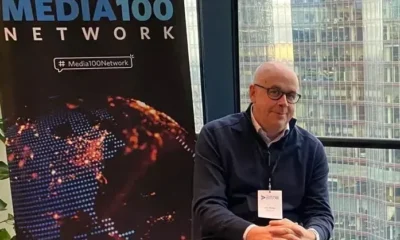
 News2 weeks ago
News2 weeks agoReach CEO Jim Mullen: If government advertises with us, we’ll employ more reporters
-
Business2 weeks ago
Maurice Terzini’s insider guide to Sydney
-
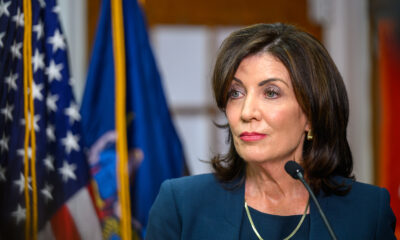
 Politics2 weeks ago
Politics2 weeks agoHochul’s careful conversations
-

 Football1 month ago
Football1 month agoMike Williamson: Carlisle United appoint MK Dons boss as head coach
-
Politics1 month ago
UK consumer confidence falls sharply amid fears of ‘painful’ budget | Economics
-

 Servers computers4 weeks ago
Servers computers4 weeks agoWhat are the benefits of Blade servers compared to rack servers?
-

 Technology3 weeks ago
Technology3 weeks agoArtificial flavours released by cooking aim to improve lab-grown meat
-
Business3 weeks ago
Should London’s tax exiles head for Spain, Italy . . . or Wales?
-

 MMA3 weeks ago
MMA3 weeks agoConor McGregor challenges ‘woeful’ Belal Muhammad, tells Ilia Topuria it’s ‘on sight’
-

 Technology4 weeks ago
Technology4 weeks agoRobo-tuna reveals how foldable fins help the speedy fish manoeuvre
-

 Technology3 weeks ago
Technology3 weeks ago‘From a toaster to a server’: UK startup promises 5x ‘speed up without changing a line of code’ as it plans to take on Nvidia, AMD in the generative AI battlefield
-

 Football3 weeks ago
Football3 weeks agoFootball Focus: Martin Keown on Liverpool’s Alisson Becker
-

 MMA3 weeks ago
MMA3 weeks agoHow to watch Salt Lake City title fights, lineup, odds, more


You must be logged in to post a comment Login